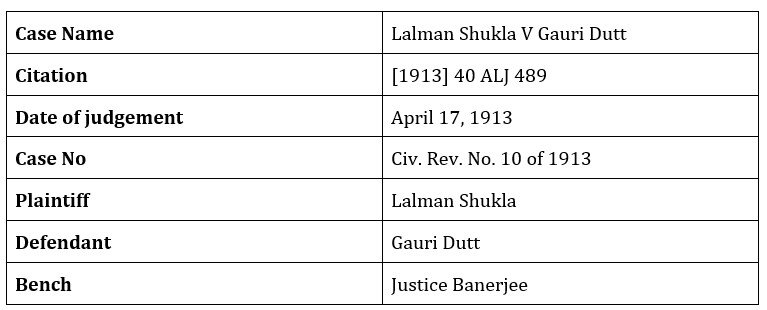![[1913] 40 ALJ 489](https://legalvidhiya.com/wp-content/uploads/2022/12/Screenshot-72-1024x576.png)
This article is written by Monika Berar of BA.LL.B., 6th Semester, RNB Global University, Bikaner.

Facts of the case
The nephew of Gauri Dutt (defendant) went missing. Gauri Dutt went out with a few of his servants to look for him after learning this. One of the servants sent to look for the missing nephew was the plaintiff (Lalman Shukla). The money for travel and other expenses was provided to the servants. Lalman Shukla made the trip from Kanpur to Haridwar in order to look for his nephew.
The defendant announced that anyone who successfully located the missing nephew and returned him to his family without incident would receive Rs. 501 in reward money while the plaintiff was away. The plaintiff, however, was unaware of this offer because the announcement was made while he was out of the office.
The defendant provided the plaintiff two sovereigns and a sum of Rs. 2 after locating the nephew and returning him to his home. The plaintiff was satisfied and made no further demands.
After some time the plaintiff came to know about the announcement through a newspaper and he demanded money for the reward. Hence, the plaintiff filed the case against Gauri datt by claiming the reward.
Issue raised
- Whether there was any offer and acceptance between the parties?
- Whether Lalman Shukla is entitled to get reward?
Contention of the Plaintiff
Lalman Shukla, the plaintiff, vehemently asserted that his mere performance of finding the missing child was sufficient for him to be entitled to the award. Because whomever located the lost child and brought him back would receive the reward in accordance with Gauri Dutt’s condition. As a result, the plaintiff had located the youngster and took him home in accordance with the defendant’s requirement.
He said that, particularly in this case, prior knowledge of the payoff is not necessary. He further underlined that Section 8 of the ICA 1872 specifies that “the performance of the act or the acceptance of any consideration of a proposal is an acceptance of the proposal.”
And in this particular case, the defendant Gauri Dutt indicated that finding the missing child was a requirement for receiving the reward of Rs. 501.
According to him, it is irrelevant whether the person who performed the deed was aware of the requirement in order to receive the prize.
Contention of the defendant
Defendant contends, alleging that plaintiff Lalman Shukla was unaware of the offer and did not know until he found defendant’s nephew. Proposals cannot therefore be accepted without knowledge of the proposed party or promise.
Defendants therefore argued that consent was essential to the formation of a contract between the parties. This means that the person receiving the offer must have a good understanding of the facts to give consent or consent before accepting the offer. However, in this particular case, the plaintiff had no idea of the compensation involved, and the plaintiff was simply doing his duty. Therefore, there is no enforceable agreement under Section 2(h) of the ICA as no acceptance has been made. According to defendant Gauri Dutt, Lalman Shukla was not entitled to the bounty, so he could not claim it.
Ratio decidendi
It was derived from the case that
- There must be a knowledge of the facts of the offer and proposal
- And there should be acceptance of the offer.
The offeree, or the person to whom the offer is made, must accept the offer. As noted in ICA section (4), the communication on the offer is equally crucial. According to this, a communication is only complete when the recipient of it is aware of it.
Both knowledge and assent are necessary for a proposition to become an agreement. Both were absent in this particular instance.
There was no legitimate contract between the two parties because the plaintiff was in the dark and hadn’t approved or accepted the proposition.
The plaintiff’s duty and responsibilities at the time he was looking for the youngster were those of a servant. Lalman Shukla, the plaintiff, was therefore not entitled for the reward.
Judgement
The court rejected the petitioners’ appeal against the respondent Gauri Dutt in the Lalman Shukla v. Gauri Dutt case. The honourable court concluded after carefully considering all the relevant facts of the case that awareness of and consent to the proposer’s offer are necessary for the formation or execution of a legally binding contract. It must be properly accepted, or the offeree must consent before accepting, which was not the case in this instance.
When the plaintiff committed his announcement for reward, he was unaware of the incentive. Later, he discovered that there was no chance for him to accept the offer. As a result, the court determined that the appellant Lalman Shukla was not eligible to receive the award because there was no contract in place and he lacked any previous awareness of the details limiting his ability to do so.
Lalman Shukla, according to the judge, was finding the missing youngster as part of his duty as a servant. He was only performing a part of his responsibility. Because there was no contract between the parties, the court fully dismissed his lawsuit against the defendant.
Related case laws
The petitioner made the following arguments in support of the cases:
In the case of Gibbons v. Proctor, the court found that even if a party to a contract complies with specific terms even though they are unaware of the reward or are unaware of it, they are still entitled to that benefit. The respondent made an argument in favour of the claim.
Snedaker vs. Fitch
Fitch was not eligible for the incentive in this circumstance since accepting the offer while being unaware of it is not the same as accepting it. Additionally, the offeree must be fully informed of the prize before accepting the offer, which entails. A person who provides information without knowledge cannot assert ignorance.




0 Comments